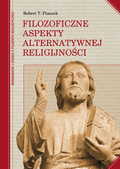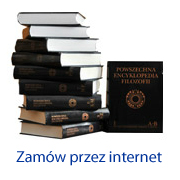 Robert T. Ptaszek
Robert T. Ptaszek
Filozoficzne aspekty alternatywnej religijności
w serii "Monografie i studia z filozofii realistycznej"
Książka Filozoficzne aspekty alternatywnej religijności Roberta T. Ptaszka zawiera filozoficzną analizę wielu nurtów, prądów i ruchów religijnych, które powstają w opozycji do Kościoła katolickiego, wspólnot chrześcijańskich oraz innych wielkich religii świata. Autor określa to zjawisko jako powstawanie „alternatywnych ruchów religijnych” lub „alternatywnych form religijności” i pokazuje, że towarzyszy ono wielkim religiom od początku ich istnienia. Jednak dopiero w latach 70. ubiegłego wieku badania naukowe dotyczące alternatywnej religijności stały się odrębną dyscypliną naukową. Obecnie kilkuset uczonych na całym świecie zajmuje się studiowaniem różnych aspektów tej problematyki.
Autor wpisuje się w szerszy kontekst badań naukowych prowadzonych przez takich badaczy, jak: Massimo Introvigne, J. Gordon Melton czy Eileen Barker. Specyfiką książki jest wykorzystanie realistycznej filozofii bytu jako głównego źródła dla zastosowanego w tej książce aparatu naukowego. To ważne, bo badania nad alternatywnymi formami religijności mają najczęściej charakter historyczny, socjologiczny, psychologiczny, prawny, teologiczny czy politologiczny. Niewiele jest natomiast filozoficznych ujęć tej problematyki, a ujęć realistycznych – opartych na klasycznej filozofii bytu – po prostu nie ma.
Książka ma charakter pracy z zakresu filozofii stosowanej – inaczej mówiąc: Autor wykorzystuje filozofię w roli narzędzia – w prezentacji i analizie doktryn alternatywnych ruchów religijnych. Wiadomości historyczne, zawartość krytycznie opracowanych źródeł oraz konteksty społeczne podjętych tematów składają się na bazę, która zostaje poddana analizie (oraz ocenie) w świetle realistycznej filozofii bytu, rozwiniętej przez Lubelską Szkołę Filozoficzną, do której Autor należy.
Książka składa się z dwóch części. Pierwsza porządkuje dotychczasową wiedzę na temat alternatywnej religijności. Wyjaśnione są w niej kwestie terminologiczne, przyczyny i źródła wyników dotychczasowych badań nad oddziaływaniem alternatywnych ruchów religijnych (w zakresie zarówno indywidualnym jak i społecznym), oraz – co najważniejsze – metody badania tych ruchów. Część ta zawiera także prezentację najważniejszych sekt i herezji w dawnej Europie oraz alternatywnych ruchów religijnych powstałych w czasach nowożytnych i współczesnych.
Zagadnienia omówione w części I rozprawy pozwalają Autorowi na podjęcie w części II problematyki, stanowiącej główny przedmiot książki. Dotyczy ona relacji między ideami filozoficznymi a doktrynami i nauczaniem alternatywnych ruchów religijnych. W rozdziale czwartym Autor prezentuje najważniejsze współczesne koncepcje filozoficzne, za sprawą których alternatywne ruchy religijne zyskały obecną pozycję w zachodniej kulturze. Rozdział piąty zawiera rekonstrukcję i analizę doktryn trzech najbardziej znanych alternatywnych ruchów religijnych odwołujących się do Biblii: Świadków Jehowy, Kościoła Jezusa Chrystusa Świętych w Dniach Ostatnich (mormonów) oraz Kościoła Adwentystów Dnia Siódmego. W rozdziale szóstym Autor wskazuje najważniejsze różnice między alternatywnymi ruchami religijnymi odwołującymi się do Biblii a wzorcową religią, za którą przyjęta została na potrzeby tej rozprawy religia katolicka.
Punktem ciężkości książki jest filozoficznie pogłębiona, racjonalna analiza doktryn alternatywnych ruchów religijnych. Jest to cel ważny nie tylko ze względów teoretyczno-poznawczych ale i praktycznych, jako że alternatywne ruchy religijne są źródłem konkretnych zjawisk społeczno-kulturowych, niekiedy bardzo niekorzystnych z punktu widzenia rozwoju osobowego oraz współżycia międzyludzkiego. W oparciu o liczne przykłady Autor wykazuje, jak określony klimat intelektualny sprzyja powstawaniu i rozwojowi alternatywnych ruchów religijnych. Szczególnie istotne jest jednak to, że na potrzeby swoich analiz i ocen Autor dokonuje szczegółowej rekonstrukcji oraz prezentacji doktryn alternatywnych ruchów religijnych. Takie ujęcie tematu czyni książkę interesującą zarówno dla filozofa, jak też teologa i religioznawcy.
Wydanie książki zostało sfinansowane w ramach programu Ministra Nauki i Szkolnictwa Wyższego pod nazwą „Regionalna Inicjatywa Doskonałości” nr projektu 028/RID/2018/19.
The book Philosophical Aspects of Alternative Religiousness contains a philosophical analysis of various trends, currents, and religious movements that arise in opposition to the Catholic Church, Christian communities, and other great world religions. The author describes this phenomenon as the emergence of “alternative religious movements” or “alternative forms of religiousness” and shows that such phenomenon has accompanied the great religions since their inception. However, it was not until the 1970s that the scientific study of alternative religiousness became a distinct academic discipline. Today, several hundred scholars around the world are engaged in studying various aspects of this problématique.
The author’s studies fit into the broader context of scientific research conducted by such scholars as Massimo Introvigne, J. Gordon Melton, and Eileen Barker. The specificity of the book is the use of the realistic philosophy of being as the main source for the scientific apparatus used by the author. This is important because research on alternative forms of religiousness is usually historical, sociological, psychological, legal, theological, and political. Philosophical approaches to this issue are scarce, and the classical-philosophical approaches –based on the realistic philosophy of being – simply do not exist.
The book is a work of applied philosophy. In other words, the author uses philosophy as his intellectual tool in the presentation and analyses of the doctrines of alternative religious movements. The point of departure is basic historical information, the content of the available and critically researched, written sources, and the social context of the discussed movements. These three constitute the input that is analyzed (and evaluated) in the light of the realistic philosophy of being developed by the Lublin Philosophical School, to which the author belongs.
The book consists of two parts. The first part organizes the existing knowledge on alternative religiousness. The author explains the terminology, the reasons for, and sources of, research into the impact of alternative religious movements (both individually and socially), and, most importantly, the methods used to study these movements. This part of the book also includes a presentation of the most notable sects and heresies in ancient and medieval Europe, as well as an overview of alternative religious movements in modern and contemporary times.
The issues discussed in Part I of the book allow the author to take up in Part II the problématique which is the main subject of the book. It concerns the relation between philosophical ideas on the one hand and the doctrines and teachings of alternative religious movements on the other. In the fourth chapter the author presents the most important contemporary philosophical concepts thanks to which alternative religious movements gained their present position in the Western culture. The fifth chapter contains a reconstruction and analysis of doctrines of three most widely known, Bible-based alternative religious movements: Jehovah’s Witnesses, the Church of Jesus Christ of Latter-day Saints (Mormons), and the Seventh-day Adventist Church. In the sixth chapter, the author points out the most important differences between the alternative religious movements referring to the Bible and the model religion, which for the purpose of this dissertation is the Catholic religion.
The focus of the book is a philosophically deepened, rational analysis of the doctrines of alternative religious movements. This is an important goal not only from the theoretical-cognitive standpoint but also for practical reasons, since alternative religious movements are the source of concrete socio-cultural phenomena, which sometimes are highly questionable from the point of view of the individual development of a human person and basic human coexistence. Based on numerous examples, the author shows how a certain intellectual climate favors the emergence and development of alternative religious movements. Particularly important, however, is the fact that for the purposes of his analyses and evaluations, the author has accomplished the task of reconstructing and presenting in detail the doctrines of alternative religious movements he discusses. This approach to the subject makes the book an interesting read not only for philosophers and theologians, but also for cultural and religious scholars.
The publication of the book was funded by the Minister of Science and Higher Education within the program under the name “Regional Initiative of Excellence” (project number 028/RID/2018/19).
Lublin 2021, s. 438, cena 67 zł (twarda oprawa)
ISBN 978-83-65792-32-7






